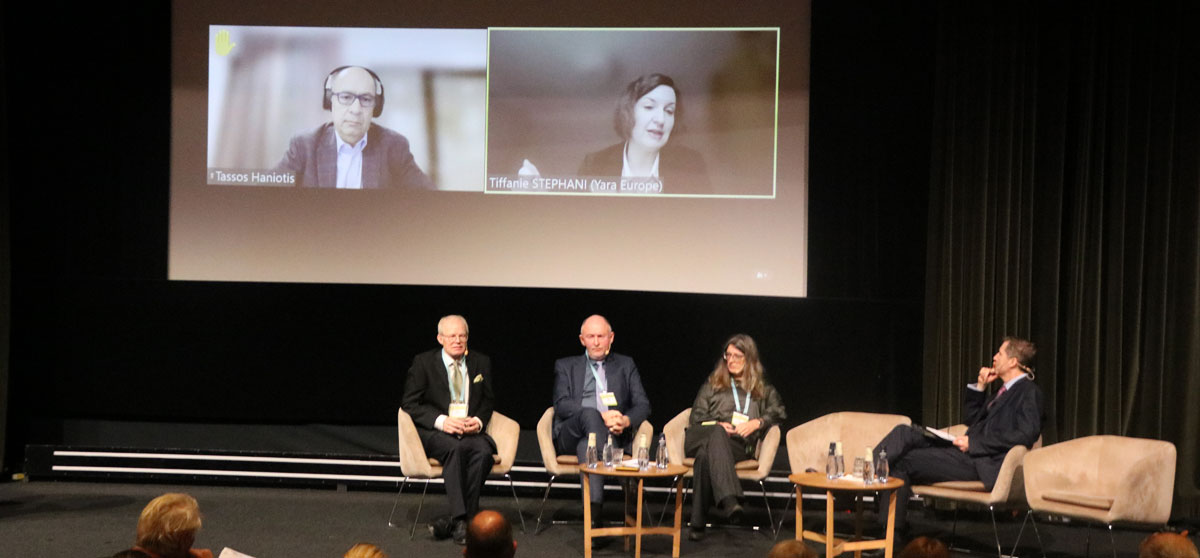2022 Regional Sweden – Session 1 summary – Food security and National Strategic Plans – how to deliver environmental targets
2022 Regional meeting Sweden
Thursday, Dec 01, 2022
At the ForumForAg, Swedish Regional Conference on December 1, speakers and panellists examined the theme, “Food security and National Strategic Plans – how to deliver environmental targets”. All agreed on the crucial role innovation must play to achieve the different goals.
What’s really new in terms of food security uncertainties?
Tassos Haniotis, former Director of Strategy, Simplification and Policy Analysis, DG AGRI, European Commission, highlighted extreme uncertainty in three interlinked areas – agricultural and food markets, energy markets and emerging shifts in trade flows – in his keynote speech. The combination is pushing up prices and has the potential for very asymmetric impacts on regions and sectors.
He set out the similarities and differences between the 2008 debt crisis and the situation today. There are similarities in high prices, volatility in commodities, energy costs and food security concerns – both in terms of affordability and availability – but also differences. 2008 was a demand driven debt crisis. Now we have supply chain bottlenecks, high gas prices pulling up other energy costs, inflation and war in Europe. These outside factors impact on EU agricultural policy and the green transition.
Mr Haniotis examined the trade-off between food security and emissions and presented what he termed “three false dilemmas”. The first is to pit food security against climate action. Both are global problems which have to be addressed internationally and are capable of delivering major synergies. Secondly, he considered the issue of public goods versus private vices. These two dimensions – environmental and economic – should be brought together, rather than seen as opposites. Finally, local action and global solutions are not alternatives, but complementary, each providing solutions at their own level.
Per Frankelius, PhD, Associate Professor (Docent) in Business Administration at Linköping Universit, addressed in the opening speech the question: “How can we reach environmental and economic goals at the same time: A matter of tradition, initiation or innovation?”. He was confident both goals are achievable, pointing out how technological development had made agriculture two and a half times more productive now than in 1950.
The key to achieving those goals is innovation, which itself depends on four factors: developers engaged in trying to do things; users prepared to implement new ideas; institutions, organisations and policy that promote innovation; and the X factor including tradition and imitation. “We are not investing enough in innovation and we do not have a regulation system that promotes innovation,” he maintained.
Åsa Wolgast Broberg, Deputy Director, Swedish Ministry of Enterprise and Innovation, department of Rural Affair, presented details of Sweden’s national strategic plan for the CAP. This is worth about €6 billion, with 75% from the EU and 25% from the government. A chief aim is to simplify what had previously been very burdensome administration and finding “a new way of doing the CAP in Sweden”. The government is helping farmers and landowners to tackle the environmental and climate issues it cannot do itself.
The plan is looking to increase sustainable food production, investment, knowledge and innovation and to attract young farmers, through extra income payments, to the sector. Emphasis is being placed on middle-sized farms of 150 hectares, rather than the very small farms favoured by the European Commission. The government has simplified the plan by moving some areas – nature restoration, carnivore protection, rural and climate investment – from the CAP to national support schemes.
Tiffanie Stephanie, Vice-President, European Government Relations and External Communications, Yara International – Region Europe, agreed that innovation was key “because ultimately there is no other way that we can also progress towards better practices and transform the agri-food system together”. Yara is changing the way it produces fertilisers, improving how they are used and has developed a decarbonisation roadmap for its various plants.
The company plans to market green fertilisers (produced with renewable energy, not natural gas as now) in 2023. It provides a digital platform on improved nutrient management for farmers. More sophisticated use of fertilisers can ensure fewer greenhouse gas emissions, less nutrient richness, better protection for biodiversity and better economics for farming. Best practice in fertiliser use can increase farmers’ incomes by 5-7% and reduce nutrient losses by up to 20%.
Ms Stephanie suggested that the CAP strategic plans should be a vehicle to upscale best practice and support more innovation such as precision and digital farming tools.
Algis Gaizutis, Chairman at Forest and Land Owners Association of Lithuania, called for “less bureaucracy and more competence” in regulating the sector to enable landowners to be economically viable and deliver the food required. In Lithuania, there is discussion of following Sweden’s example and excluding some activities from the CAP.
He agreed with the point Mr Haniotis had made earlier that farmers are more likely to follow practical examples from their neighbours, rather than advice from bureaucrats and politicians. He appealed for food to be sourced locally, rather than from abroad and called for efforts to promote the countryside lifestyle to encourage young farmers to enter the profession.
Click here to view videos from the Sweden event.
Click here to view the agenda and speakers bios from the Sweden event.



